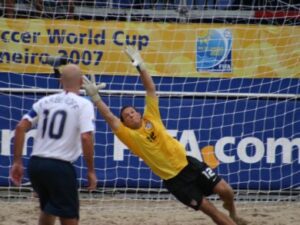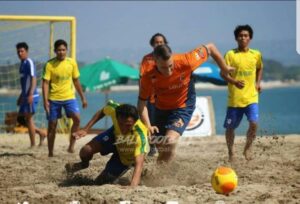 Beach Soccer Origins have journeyed from the beaches of Brazil to the hearts of millions of fans all over the globe. The participation of internationally renowned players such as flamboyant Frenchman Eric Cantona, legendary Spanish strikers Michel and Julio Salinasand Brazilian samba stars such as Romario Junior and Zico has helped to expand television coverage. Large audiences in over 170 countries worldwide, have made Beach Soccer one of the fastest growing professional sports in the world. It has converted into a major showcase for international commercial opportunity (BSWW).
Beach Soccer Origins have journeyed from the beaches of Brazil to the hearts of millions of fans all over the globe. The participation of internationally renowned players such as flamboyant Frenchman Eric Cantona, legendary Spanish strikers Michel and Julio Salinasand Brazilian samba stars such as Romario Junior and Zico has helped to expand television coverage. Large audiences in over 170 countries worldwide, have made Beach Soccer one of the fastest growing professional sports in the world. It has converted into a major showcase for international commercial opportunity (BSWW).
Beach soccer, a dynamic and exciting variant of traditional football, has a rich history that dates back several decades. The sport’s origins can be traced to the sun-soaked beaches of Brazil, particularly the Copacabana Beach in Rio de Janeiro. It is believed to have emerged in the mid-1950s[1][7]. However, pinpointing the exact beginning of beach soccer is challenging. Informal games on beaches have been played for centuries.
The modern era of beach soccer origins began in 1992 when the founding partners of Beach Soccer Worldwide (BSWW) established the official rules of the game[1][4]. This crucial step provided the sport with a structured framework for growth and development. The following year, in 1993, the first international beach soccer event took place in Miami, USA, marking a significant milestone in the sport’s history[1][9].
## Rise to Prominence
Beach soccer quickly gained popularity due to its fast-paced nature, emphasis on skill, and exciting gameplay. The sport’s growth was fueled by the creation of several international competitions:
1. The Beach Soccer World Championships, which began in 1995[9].
2. The Pro Beach Soccer Tour, launched in 1996, which included 60 games across South America, Europe, Asia, and the United States over two years[7][9].
3. The European Pro Beach Soccer League, established in 1998[1].
In April 1994 the first event to be covered by network television transmissions was held on the Copacabana Beach in Rio de Janeiro and the city hosted the inaugural Beach Soccer World Championship one year later. The competition was won by the host nation, making Brazil the first ever World Champions of Beach Soccer (BSWW).
These events helped spread the sport’s popularity globally and attracted both players and spectators.
 ## FIFA Recognition and Global Expansion
## FIFA Recognition and Global Expansion
A pivotal moment in beach soccer’s history came in 2005 when FIFA officially recognized the sport and organized the first FIFA Beach Soccer World Cup in Rio de Janeiro[1]. This recognition propelled beach soccer onto the world stage and led to its rapid growth and professionalization.
## Pro-Am Beach Soccer’s Impact
 Pro-Am Beach Soccer has played a significant role in the sport’s development, particularly in the United States. The organization has contributed to beach soccer’s growth by:
Pro-Am Beach Soccer has played a significant role in the sport’s development, particularly in the United States. The organization has contributed to beach soccer’s growth by:
1. Offering the sport to all age groups, from youth (starting at 8U) to adults, thus broadening its appeal and accessibility[6].
2. Organizing tournaments and events that have helped increase participation and visibility of beach soccer in the USA[5].
3. Providing a platform for both amateur and professional players to compete, thereby bridging the gap between recreational and elite levels of the sport.
Pro-Am Beach Soccer’s efforts have been particularly important in recent years. The organization has worked to keep the sport moving forward despite challenges such as the COVID-19 pandemic[8]. Their commitment to developing beach soccer at various levels has contributed to its growing popularity. It helped establish a strong foundation for the sport’s future in the United States.
In conclusion, beach soccer has evolved from informal games on Brazilian beaches to a globally recognized sport. It now has professional leagues and international competitions. Organizations like Pro-Am Beach Soccer have played a crucial role in this journey. It has helped to popularize the sport and create opportunities for players of all skill levels to participate and compete.
Citations:
[1] https://beachsoccer.com/history
[2] https://proambeachsoccer.net/beach-soccers-impact-on-player-development/
[3] https://www.researchgate.net/publication/372848042_Beach_Soccer_Histories
[4] https://en.wikipedia.org/wiki/Beach_Soccer_Worldwide
[5] https://proambeachsoccer.net/category/sports/
[6] https://www.sportsdestinations.com/sports/soccer/pro-am-beach-soccer-19265
[7] https://australianbeachsoccer.com.au/origins-of-beach-soccer/
[8] https://proambeachsoccer.net/beach-soccer-moving-past-covid/
[9] https://proambeachsoccer.net/beach-soccer-origin/
[10] https://www.usbeachsoccer.greenlevadait.com/index.php/history-of-us-beach-soccer.html
[11] https://en.wikipedia.org/wiki/Beach_soccer

 ## FIFA Recognition and Global Expansion
## FIFA Recognition and Global Expansion